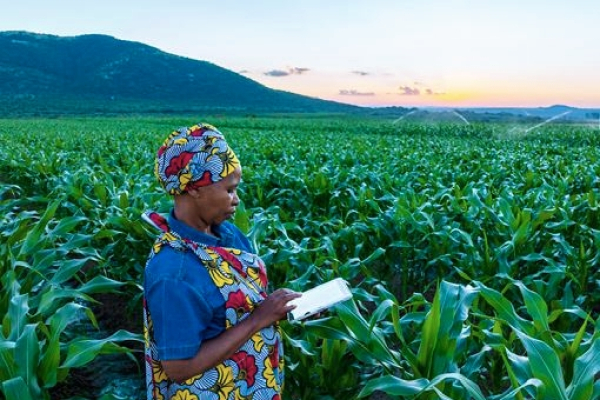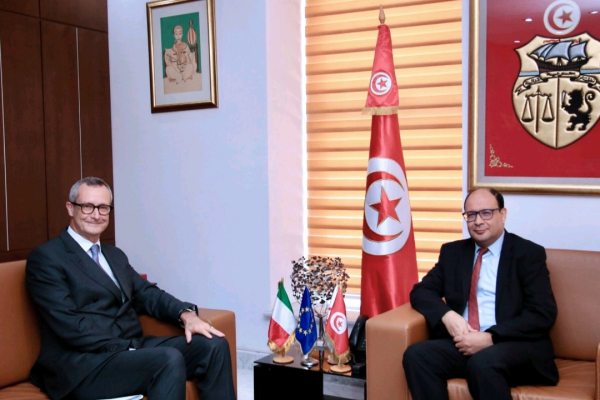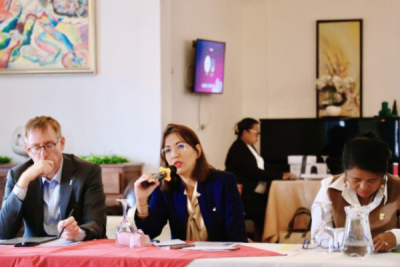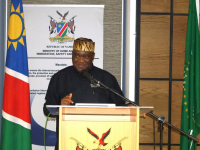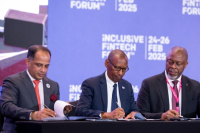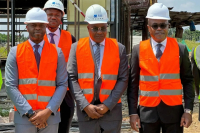Africa, with its vast territories and growing population, faces an urgent need for digital connectivity. Despite progress made, many regions remain excluded from Internet access, hindering their economic and social inclusion in an increasingly digital world.
Orange Africa and Middle East (OMEA) and French satellite company Eutelsat announced a partnership on Tuesday, March 3, to accelerate the deployment of satellite internet across Africa and the Middle East. The goal is to reduce the digital divide in these regions by providing reliable and affordable high-speed access, particularly in underserved "white zones" lacking connectivity.
"This partnership illustrates our commitment to connecting all territories and bridging the digital divide in Africa and the Middle East. Today, Orange serves more than 160 million customers in the region, and is pursuing its ambition to provide digital access for all," said Jérôme Hénique, CEO of Orange Africa and Middle East.
The partnership leverages the Eutelsat Konnect satellite, an advanced technology enabling download speeds of up to 100 Mbps. Initial deployments will focus on Côte d'Ivoire, Senegal, and the Democratic Republic of Congo, with plans to gradually expand across the region. The initiative aims to bridge the connectivity gap in remote areas by providing tailored solutions for both individuals and businesses.
The agreement reflects a shared commitment to reducing the digital divide by offering high-speed access to currently underserved regions. According to the "The Mobile Economy Sub-Saharan Africa 2024" report by the GSMA, Sub-Saharan Africa is the world's least connected region, with only 27% of the population using mobile internet services, leaving a 13% coverage gap and a 60% usage deficit.
By combining Orange’s telecommunications expertise with Eutelsat’s technological innovation in satellite services, the partnership is expected to deliver tailored offerings for both individuals and businesses, ensuring secure, reliable, and high-performance connectivity. The complementarity of fixed, mobile, and satellite technology solutions will help connect isolated areas and meet the growing demand for internet access in the region.
By Samira Njoya,
Editing by Sèna D. B. de Sodji
In its bid to grow its digital sector, Tunisia, like other African nations, is pursuing international partnerships, recently strengthening ties with India and France.
Tunisia and Italy discussed enhancing their information and communication technology (ICT) cooperation during a meeting on Monday, March 3, between Tunisian Minister of Communication Technologies Sofiene Hemissi (photo, right) and Italian Ambassador to Tunisia Alessandro Prunas (photo, right).
During the discussions, both parties emphasized areas related to promoting innovation, supporting entrepreneurship, and developing startups.
This potential cooperation could bolster the Tunisian government's digital transformation ambitions, a key pillar of its socioeconomic development strategy. In 2024, Tunisia ranked 87th globally in the United Nations' E-Government Development Index (EGDI), with a score of 0.6935 out of 1, surpassing both African and global averages. In cybersecurity, Tunisia was classified in the third category out of five by the International Telecommunication Union (ITU). The country acknowledges the need for further efforts in organizational measures, capacity building, and cooperation.
Italy, meanwhile, is recognized as a leader in cybersecurity. According to the ITU, this reflects a strong commitment to cybersecurity through coordinated and government-led actions. This includes the assessment, establishment, and implementation of generally accepted cybersecurity measures across all five pillars or up to all indicators. Italy also has an EGDI of 0.8355 out of 1, ranking 51st globally.
The discussions are in their early stages. The exact scope of the potential collaboration remains undefined, and no official agreement has been announced. The progress of negotiations will be monitored to provide further insight into the direction and potential implications.
By Isaac K. Kassouwi,
Editing by Sèna D. B. de Sodji
The increasing prevalence of fake diplomas, driven by readily available technology, seriously undermines global education standards. However, blockchain technology presents promising solutions to combat this growing issue.
The Tunisian government has adopted a blockchain-based diploma verification system across its higher education institutions, aiming to combat widespread fraud.
The move follows a 2023 investigation by the Tunisian Association for the Fight Against Corruption, which revealed that an estimated 120,000 to 200,000 civil servants were allegedly hired between 2011 and 2021 using fake diplomas.
On Friday, February 28, Tunisia implemented the Unified Arab System for Diploma Authenticity Verification, utilizing blockchain technology. The system stores each diploma as a unique, secure, and tamper-proof block, protecting academic records from forgery, fraud, and unauthorized modifications. Institutions, employers, and stakeholders can instantly verify diploma authenticity, bypassing lengthy administrative processes.
The use of blockchain in higher education is not new. The Massachusetts Institute of Technology (MIT) implemented a secure digital diploma program on blockchain in 2017. In Africa, similar initiatives are emerging. Some Nigerian universities are experimenting with blockchain-recorded diplomas to ensure authenticity and simplify verification.
A study by Market Research Future projects the blockchain market applied to education could reach $1.3 billion by 2030, with an estimated annual growth rate of 33.7%. This growth reflects increased adoption of the technology by educational institutions seeking secure and simplified diploma management.
In Tunisia, the project is part of the Ministry of Higher Education and Scientific Research’s digital transformation strategy. It aims to ensure diploma integrity, develop digital skills, and modernize the education sector. The initiative stems from a November 2024 cooperation agreement between Tunisia and the Arab League Educational, Cultural, and Scientific Organization (ALECSO). A pilot project in three Tunisian institutions demonstrated the solution's effectiveness, leading to nationwide implementation.
Beyond combating fraud, the innovation is expected to facilitate academic and professional mobility by ensuring immediate and unquestionable recognition of diplomas nationally and internationally. It also represents a strategic advancement for Tunisia’s education system, strengthening the credibility and competitiveness of its universities globally.
By Samira Njoya,
Editing by Sèna D. B. de Sodji
In Burkina Faso, Patrick Paré is revolutionizing e-mobility with his new ride-hailing solution. His initiative is part of a drive to modernize urban transport while addressing the country's environmental and economic challenges.
LetsGo, an e-mobility solution developed by a Burkinabé startup, launched last week by Patrick Paré, offers eco-friendly ride-hailing services via a mobile application to residents of Ouagadougou.
"Our ambition is to redefine the standards of private transport in Africa and make every ride an exceptional experience. At LetsGo, every trip is designed to offer a unique and pleasant experience. We are committed to ensuring a high-quality service by focusing on three essential pillars: a commitment to safety, a personalized experience, and impeccable service," Paré stated.
The service is accessible through a mobile application, available on iOS and Android, which has been downloaded more than a thousand times, according to Play Store statistics. Users create an account, then book a taxi in a few clicks, track their journey in real-time, and benefit from transparent and competitive fares.
LetsGo offers an eco-friendly alternative to conventional fuel-powered taxis. With a fully electric fleet, the service aims to reduce greenhouse gas emissions and combat air pollution, a growing issue in major African cities. In addition to its environmental impact, it aims to provide an affordable and efficient transportation solution for Ouagadougou residents.
The deployment of this solution contributes to job creation and the modernization of the transport sector in Burkina Faso. "We actively contribute to Burkina Faso’s economy and culture through several commitments, such as supporting local employment by exclusively hiring Burkinabé drivers," Paré emphasized.
By Adoni Conrad Quenum,
Editing by Feriol Bewa
Successful digital transformation requires identifying challenges and implementing effective solutions. In Madagascar, key obstacles include limited infrastructure access, high connectivity costs, and a digital skills shortage.
Madagascar's Ministry of Digital Development, Posts, and Telecommunications, in collaboration with the United Nations Development Programme (UNDP), launched a Digital Readiness Assessment (DRA) on Feb. 27 in Antsirabe. This initiative aims to provide a comprehensive diagnosis of the country's digital sector and identify priority actions to address existing gaps, supporting Madagascar's goal of full integration into the digital economy.
In recent years, the has made significant progress, notably through the development of mobile money and the rise of local tech startups. However, several challenges remain. The country continues to face major structural obstacles, including limited access to digital infrastructure, high connectivity costs, and a digital skills gap.
According to DataReportal, in January 2024, the internet penetration rate in Madagascar was 20.6%, with 6.31 million users out of a total population of 30.68 million. However, this coverage remains uneven, particularly in rural areas. Regarding the cost of connectivity, the Malagasy government announced last October its intention to reduce telecommunications service tariffs to improve the population’s access to the internet. Despite these efforts, the cost of mobile internet access still represents 15.5% of the monthly gross national income (GNI) per capita, well above the International Telecommunication Union (ITU) recommendation of 2% of the monthly GNI per capita.
The digital skills gap also remains a major obstacle. The 2023-2028 Digital Strategic Plan highlights a shortage of approximately 40,000 specialized technicians needed to enable an effective digital transformation of the country. In this context, the Ministry of Digital Development has launched a program aimed at training 6,000 people in emerging digital professions over the next three years to address this urgent need.
To meet these challenges, the DRA represents a fundamental first step. This assessment is based on five key pillars: connectivity, to strengthen infrastructure and reduce the digital divide; governance, to improve coordination between sector stakeholders; regulation, to create a legal framework suited to the digital economy; businesses, to encourage innovation and technological entrepreneurship; and human capital, an investment in digital skills training.
The DRA is not limited to a simple assessment of the situation. It also serves as the basis for a strategic roadmap, aligned with Madagascar’s sustainable development priorities. Through this assessment, the country hopes to define a coherent digital vision that will not only accelerate its transformation but also help reduce inequalities in access to opportunities offered by the digital sector.
By Samira Njoya,
Editing by Sèna D. B. de Sodji
IHS Nigeria, a subsidiary of IHS Holding Limited, has launched incubation and acceleration programs at the Ilorin Innovation Hub in Kwara State ahead of its official opening, the company announced on February 27.
Built in partnership with the Kwara State Government, the hub aims to drive innovation, entrepreneurship, and economic growth.
Together, their vision is to create over 10,000 jobs, focusing on digital skills, AI, agritech, and energy innovation.
Digital applications help authorities vet travelers in advance, improving security while reducing administrative burdens. By allowing travelers to apply for visas online before arrival, Namibia reduces congestion at borders, improving the overall travel experience.
Namibia has introduced an online application system for visas on arrival, marking a major step toward modernizing its visa process. Minister of Home Affairs, Albert Kawana, officially launched the initiative on March 3, 2025, at the ministerial conference hall.
Minister Kawana emphasized that while this new system enhances travel convenience, the visa application process for countries that do not qualify for visas on arrival remains unchanged. These travelers must continue to apply in advance via the Ministry’s online platform and await approval before entering Namibia.
The system allows eligible travelers to apply for visas before arrival, ensuring a smoother and more efficient entry process. The minister also reaffirmed Namibia’s commitment to fostering diplomatic and economic ties by engaging with nations interested in reciprocal visa agreements.
Starting April 1st, the new policy will apply to countries such as Benin, Burundi, Chad, the Central African Republic, Ghana, Guinea, Niger, Rwanda, and Togo. Citizens of African nations will pay approximately $70 for a tourist or holiday visa application.
Namibia has been actively digitalizing its immigration processes to enhance efficiency and accessibility. Key initiatives include the launch of an online application system for Short-Term Employment Permits (Work Visas) and Namibian Ordinary Passports in 2023, allowing applicants to apply, schedule appointments, and monitor application statuses online, reducing the need for in-person visits. Also, in 2022, Namibia introduced the Digital Nomad Visa to attract remote workers. The Visa permits eligible individuals to reside in the country for up to six months while working remotely for foreign-based employers.
These initiatives mark significant progress in Namibia’s digital transformation, enhancing security, modernizing services, and facilitating seamless travel.
Hikmatu Bilali
To bolster economic integration across Africa, governments are focusing on establishing a free trade area. This involves the execution of projects designed to streamline trade and cross-border transactions.
The Global Finance & Technology Network (GFTN), an organization founded by the Monetary Authority of Singapore (MAS), has partnered with the central banks of Ghana and Rwanda to launch Africa’s Next-Gen Digital Payment Infrastructure project, also known as "Project 54." The initiative aims to deploy a next-generation digital payment infrastructure, enabling instant, secure, and low-cost cross-border transactions across Africa. The project was unveiled on Tuesday, Feb. 25, at the Inclusive Fintech Forum (IFF) in Kigali.
"As stewards of the financial system, we must remain steadfast in our mission to break down barriers, empower businesses, and create inclusive opportunities for all. Through initiatives like this, we are shaping the future of Africa’s financial landscape," said John Rwangombwa, Governor of the National Bank of Rwanda.
The project aligns with the establishment of the African Continental Free Trade Area (AfCFTA), which seeks to create a single market across the continent. However, high transaction costs and slow fund transfers remain significant obstacles. According to a report by the Institute for Security Studies, remittances to Africa reached approximately $100 billion in 2022. Of this amount, $19.4 billion was transferred within Africa, underscoring the importance of intra-continental financial flows.
Project 54 aims, among other things, to facilitate money transfers between African countries. The initiative is built around three key pillars: a reliable identity infrastructure ensuring secure, verifiable, and universal digital identities to enable seamless financial transactions; an interoperable payment system creating a standardized infrastructure for real-time cross-border transactions within Africa’s financial ecosystem; and a passporting framework for fintech licenses, allowing licensed companies in one of the two participating countries to operate in the other with simplified regulatory requirements. An agreement has already been signed between Ghana and Rwanda to this effect.
In the coming months, project leaders will finalize the roadmap, harmonize regulatory approaches, and launch pilot deployments ahead of large-scale adoption. A tailored pricing model will be introduced to accommodate transactions of varying values, ensuring the system’s financial sustainability. Additionally, regulators, financial institutions, fintech companies, and investors will collaborate to co-create a sustainable digital payment ecosystem.
By Samira Njoya,
Editing by Sèna D. B. de Sodji
Digital transformation is a key priority for the Congolese government, which intends to bolster the nation's telecommunications infrastructure to support its objectives.
The Republic of Congo's new national data center is expected to be inaugurated next November, according to the government. Construction of the facility, which began in early 2024, is already 80% complete.
Léon Juste Ibombo, Minister of Posts, Telecommunications, and the Digital Economy, announced this on Thursday, Feb. 28, during a site visit. He was accompanied by Solomane Koné, Deputy Director General for Central Africa at the African Development Bank (AfDB), which is financing the project with a $13 million investment.
The specific features and technical details of the data center have not been disclosed to the public. However, it is known that it will be housed in a three-story expandable building with a basement. The facility will include dedicated rooms for servers, monitoring, and supervision, as well as meeting and conference spaces. Separate areas will be reserved for power supply and cooling equipment to ensure the data center operates efficiently.
As the Congolese government seeks to accelerate its digital transformation and make it a pillar of socioeconomic development, the data center’s commissioning could help strengthen the country’s national telecommunications infrastructure. In 2024, the United Nations Department of Economic and Social Affairs (UNDESA) gave Congo a telecommunications infrastructure index score of 0.2776 out of 1, part of the E-Government Development Index (EGDI). The country ranked 166th out of 193 globally, with its score falling below the averages for Central Africa (0.3354), Africa (0.4247), and the world (0.6382).
The facility is also expected to contribute to Congo’s digital sovereignty, according to officials. “All data generated in Congo must be stored somewhere. Currently, this data is stored abroad, which is why many of our domain names end in ‘.fr’ or ‘.com’ instead of ‘.cg.’ From now on, we will be able to host all public data within the data center, as well as data from telecommunications operators, banks, insurance companies, and other private firms that wish to store their information here—including backups of their primary storage sites,” said Michel Ngakala, Coordinator of the Central African Backbone (CAB) project, during the launch of construction in 2024.
By Isaac K. Kassouwi,
Editing by Sèna D. B. de Sodji
This groundbreaking solution aims to revolutionize cardiovascular disease management in Africa by providing continuous monitoring and easier access to healthcare professionals.
LeevLong, a medical telemonitoring solution developed by a Cameroonian startup, aims to improve the quality of life for patients, particularly those with cardiovascular diseases.
Launched in 2024, the service, led by Haoua Dally, combines connected devices with mobile and web applications to provide real-time monitoring of vital signs and facilitate communication between patients and healthcare professionals. The system includes three wearable supports—a bracelet, an armband, and a tank top—paired with a connected device that continuously collects vital signs such as blood pressure, heart rate, and body temperature. Data is transmitted via Wi-Fi, Bluetooth, or GSM, and alerts are triggered if critical thresholds are exceeded.
On the patient side, the mobile application allows users to monitor their vital signs in real-time, receive notifications and recommendations in case of anomalies, access medical assistance via teleconsultations and forums, and schedule medication intake and medical appointments.
For healthcare professionals, the web and mobile platforms provide real-time access to patients’ health data, enable teleconsultations based on availability, suggest interventions in case of abnormal vital signs, and facilitate communication through forums and a dedicated messaging system.
To access LeevLong’s services, users must first purchase the kit and subscribe to a plan. The basic subscription includes real-time data visualization, access to a discussion forum, and a history of recorded parameters. The standard plan adds anomaly alerts and teleconsultation options, while the premium package offers all these benefits along with a virtual assistant and medication and appointment scheduling features.
In February, LeevLong secured third place at the Orange Summer Challenge, an international competition by Orange promoting responsible entrepreneurship in Africa and the Middle East. Alongside support from Orange, the solution will also receive backing from Nokia, which has pledged 40,000 euros (approximately $41,630) to fund project pre-incubation and incubation.
By Adoni Conrad Quenum,
Editing by Feriol Bewa
More...
Niger, like many African nations, is pursuing digital technology as a key driver of development. The government's roadmap prioritizes modernizing administration, strengthening infrastructure, and expanding access to digital services.
Niger will adopt a national policy for the development of its digital sector next month, the government said last Wednesday. Speaking on Radio Télévision du Niger (RTN), Minister of Communication, Posts, and Digital Economy Sidi Mohamed Raliou said the policy aims to structure and accelerate the country’s digital transformation, making digital technology a driver of growth and modernization.
The national policy will encompass all sectors and government administrations, he explained. The objective is to digitize public services, gradually eliminating paper documents and optimizing service management. The policy will be supported by connectivity infrastructure, including fiber optic deployment to interconnect different regions.
The initiative is part of a broader set of strategic projects designed to strengthen Niger’s digital sector. These projects include the launch of three satellites for communications, remote sensing, and airspace surveillance, as well as the construction of a national data center to secure and centralize digital data.
Additionally, the government plans to establish a National Cybersecurity Agency to oversee IT system protection, combat cyber threats, and raise public awareness about cybersecurity best practices. Efforts are underway to improve nationwide internet access, particularly in rural areas.
The policy aligns with Niger’s ambition to modernize digital services and attract investment in the telecommunications sector. In 2024, the country scored 0.1578 out of 1 on the Telecom Infrastructure Index (TII), significantly below the African average of 0.4534, according to the United Nations. In terms of e-governance, Niger ranked 187th out of 193 countries with an index score of 0.2116. These figures highlight the significant efforts needed to enhance the country’s digital transformation.
Once adopted, the national digital policy is expected to transform Niger’s digital ecosystem by strengthening infrastructure, expanding access to online services, and improving cybersecurity. The development of broadband and the expansion of internet coverage will foster greater digital inclusion, enabling citizens and businesses to benefit from modern tools.
By Samira Njoya,
Editing by Sèna D. B. de Sodji
The Moroccan government has prioritized digital technology as a cornerstone of the country's socioeconomic development. In addition to investing in infrastructure, the administration is committed to equipping the population with the necessary digital skills to achieve these goals.
Morocco will open a new school specializing in programming and coding in the Fès-Meknès region, the government said Friday. An agreement to establish the "YouCode Fès" school was signed under the leadership of Amal El Fallah Seghrouchni, Minister Delegate in charge of Digital Transition and Administrative Reform.
"Under this agreement, the ‘YouCode Fès’ school will offer a two-year training program in information technology and digital fields. Each cohort will welcome 80 students, contributing to the expansion of employment opportunities in the digital sector within the region and improving young people’s employability in tech-related professions," the ministry said in a Facebook announcement.
The initiative aligns with Morocco’s Digital Maroc 2030 strategy, which aims to develop a high-quality talent pool in the digital sector. The government's long-term goal is to enhance its outsourcing and digital export hub. By 2030, the country aims to increase employment in the sector to 270,000 jobs, up from 130,000 in 2022. Rabat is also targeting digital export revenues of 40 billion Algerian dinars ($296.13 million) by 2030, compared to 15.8 billion dinars in 2022.
According to the World Bank, nearly 230 million jobs in Sub-Saharan Africa will require digital skills by 2030. While Morocco is not part of this region, the trend highlights the critical role of digital training in Africa’s technological transformation.
The timeline for the new school’s launch has not been announced. Similar programs may be expanded to other regions. YouCode already operates campuses in Safi and Youssoufia (Marrakech-Safi region) and in Nador (Oriental region).
By Isaac K. Kassouwi,
Editing by Sèna D. B. de Sodji
Egyptian Fintech Fawry announced on February 26 that it has invested 80 million EGP (1,579,200 US Dollar) in three leading Egyptian tech firms—Dirac Systems, Virtual CFO, and Code Zone. The new investment is part of the fintech’s strategy to expand its business solutions ‘Fawry Business’ and drive digital transformation in Egypt,
The EGX-listed company has acquired 51% of Dirac Systems, 56.6% of Virtual CFO, and 51% of Code Zone, strengthening its role as a one-stop provider of ERP, financial management, and digital payment solutions for businesses.
This investment aligns with Fawry’s vision to accelerate Egypt’s fintech and business technology sectors, equipping companies with cutting-edge digital solutions to enhance growth in an increasingly cashless and digital economy.
In Rwanda, JaliKoi positions itself as a super-app, combining convenience, financial benefits, and growth opportunities for businesses and individuals.
JaliKoi is an application developed by the Rwandan fintech Jali Finance. Launched on Monday, February 24, 2025, on the sidelines of the second edition of the Inclusive Fintech Forum (IFF), it aims to transform the financial experience for individuals and businesses by offering a comprehensive range of integrated services. The Kigali-based startup is led by Félix Nkundimana.
"Each company offers its own digital platform, forcing consumers to use multiple channels to access services. What we have done is centralize all digital services provided by different companies so that they are accessible through a single platform, JaliKoi," said Frank Mugisha, Chief Technology Officer at Jali Finance.
The JaliKoi app, available on iOS and Android, allows individuals to access financing for items such as motorcycles or vehicles, with affordable interest rates and flexible repayment terms. Users receive a percentage of their spending as cashback on each transaction, which they can use to pay bills or make new purchases.
The app also facilitates payment of utility bills, including mobile top-ups, electricity, and TV subscriptions, with cashback rewards. For businesses, the platform offers cashback-based loyalty programs, socially driven sales campaigns, and an e-commerce marketplace to sell products online.
"Fintech brings agility and innovation, while financial institutions provide trust and scale. Together, they can unlock new opportunities for growth and inclusion," said Félix Nkundimana.
The company said potential challenges to growth include raising user awareness, ensuring a smooth and secure experience, and competition. Partnerships with telecom operators and banks could strengthen its market position.
By Adoni Conrad Quenum,
Editing by Feriol Bewa


